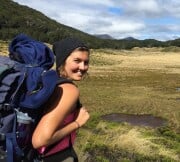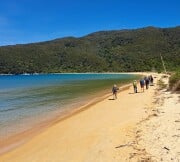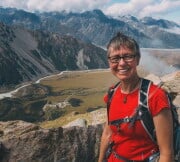- About Us
-
Trips
-
 Kiwi-Style Hiking
Kiwi-Style Hiking
-
 Great Walks
Great Walks
-
 Hiking Tours
Hiking Tours
-
Alpine Hikes
-
Custom Groups
- Huayhuash Trek
- Family Northern Explorer
- Family Southern Explorer
- Lake Waikaremoana Hike
- Women's Custom Tours
- Women's Southern Wilderness
- Coast, Canyons and Mountains
- Coastal Wanderer Custom Tour
- Don't Cross the Ladies
- Secret South Custom Tour
- Tekapo Hike
- West Coast Custom Tour
- World Heritage Custom Tour
-
- Blog
- Shortlist
- About Us
- Trips
- Blog
- Shortlist
Tour Details
Start
Nelson i-SITE Visitor Centre, Cnr Halifax St & Trafalgar St,
Finish
Queenstown
Prices
Days
11 days
Fitness grade
Grade: D
(River crossings and some uneven terrain)
(River crossings and some uneven terrain)
Transport


You will travel in a 10 or 12 seat minibus towing a trailer with camp equipment and your luggage. All vehicles have a public address system, and a stereo with a variety of music. It is also equipped with a range of natural history reference books. The average driving time per day is around 2-3 hours and there will be a range of roads - sealed and unsealed. The guide will often stop the vehicle for you to take photos. On some of the nights you will be camping by the vehicle.
Additional Costs


Optional activities: Okarito kayaking ($60*), Heli Hike (NZ$399*)
Optional activities are paid for during the trip.
* Prices for optional activities correct at time of publishing.
Grading & Fitness


Grade: D
Average 4-5 hours physical activity per day, up to 8-9 hours on longer days.
Pack weights of 10-12kgs (22-26lbs)on some days.
Altitude gains of up to 800m, (2600ft).
Some uneven track surfaces and river crossings.
No multi-day hiking experience necessary.
Agility and fitness required.
You need to be reasonably fit and enthusiastic.
Some tracks may be slippery or rough; some off-track hiking and river crossings.
Accommodation


"Wild nights" vs nights in civilisation...The West Coast Wilderness is a combination of “wild nights”, which is the nights where you are truly in the wilderness, staying in backcountry huts or camping in locations that may be several hours walk from the nearest road or populated area, versus nights in civilisation where you may stay in cabins or camp by the vehicle at Department of Conservation campsites. Some of these locations may still be relatively remote and in the wilderness but they can be reached by the vehicle.
Huts - New Zealand has an excellent network of backcountry huts and you will stay in huts on several nights. They are equipped with mattresses, running water and an outside toilet. Cooking is done on a portable stove. Huts are only accessible on foot and shared with other hikers. You also have the option of camping near the hut if that is your preference.
Camping - You will camp in a range of campsites, on the "wild nights" you may camp under natural rock shelters, on remote beaches or even sleep out under the stars (single tent available on request)! On the non -"wild nights" you will camp near the vehicle in Department of Conservation campsites. If the weather is not great for camping, eg very wet, stormy or cold conditions your guide will seek out alternative accommodation, eg lodge, cabin or crib.
Cabins/Cribs - Some nights may be spent in private cribs (summer house) or cabins at a campground. Staying in the cribs is a real authentic New Zealand experience and you may even start to feel like a kiwi on holiday! Often you can put a tent up if you want a 'room' to yourself on these nights.
Bathroom facilities - On the wild nights there will be long drop (pit) toilets. There will be rivers or lakes nearby for washing, and sometimes there are even natural hot pools! The safaris are set up so after a couple of nights of "roughing it" in the wilderness, you will stay somewhere where you can enjoy a shower and a few home comforts (including laundry facilities) before the next foray into the wild!
What to Take


|
Hire gear |
8-11 day trip (NZ$) |
|
Backpack (60 litres) |
$50 |
|
Sleeping bag |
$50 |
|
Fleece jacket |
$20 |
|
Thermal top and bottom |
$20 |
|
Raincoat |
$40 |
|
Full set (all of above) |
$140 |
|
Gaiters |
$20 |
|
Walking pole (each) |
$20
|
Food


Everybody is involved with the preparation and cooking of meals: barbecues, salads, pancakes, curries, pasta, stir-fries etc. Vegetarian meals are no problem. For all specific dietary requirements we ask that you notify us prior to departure. That way we can ensure we are catering correctly for your needs. When you are on overnight hikes the group will usually eat pasta and rice meals (gluten free is usually an option). There is always a lot of hiking food - muesli bars, chocolate, biscuits fruit and dried fruit. The vehicles carry a full range of cooking equipment including gas burners, woks, frying pans and billies. When you go on an overnight hike the group will carry portable stoves.
Guides & Safety


An excellent guide can make the difference between a trip of a lifetime and just an ordinary trip. That is why we work hard to make sure we hire the best guides. Our handpicked professionals come from a range of backgrounds. Each has extensive outdoor and hiking experience and a passion for New Zealand’s wild and beautiful backcountry. Our guides will ensure that your time with us is truly inspiring, a huge amount of fun and safe. All guides are trained in Mountain Safety First Aid.
Please be gentle with your guide - good guides are hard to find!
Questions


Does everyone get involved with camp duties?
Everyone is fully involved with the running of the safari, from collecting firewood, to setting up camp and cooking meals. You are expected to do your share of work. If you are not a great cook, dont worry - your guide and other people in the group will help you.
Does it matter if I am travelling alone?
Most of the people on safaris are travelling alone. The safaris are strong on group activities and participation including playing outdoor games, going for swims, helping one another to cross rivers, exploring secret places, and overcoming obstacles and challenges. You are encouraged to participate in activities, but if its not your thing that is also OK. Time is allowed for people to be by themselves on safari if they need it.
Can I do more than one safari?
Yes. More and more people are doing connecting safaris covering the whole of New Zealand. This really is the hassle-free way to experience New Zealands best adventures. Safaris are timed to leave you a couple of days in between trips to get your laundry done and experience some city activities.
What do I do with my valuables (passport, airline tickets, money, etc.) while hiking?
Keep them with you in your hiking pack. You can pack all those things in plastic bags to keep them dry and keep them with you while hiking.
I have specific dietary requirements - is that a problem??
Vegetarians, gluten free and dairy free hikers join our trips regularly. Please let us know in advance as meals take more planning. Everyone takes a turn in meal preparations, if you have complex dietary requirements you may need to be involved more frequently. It is advisable to join the trip with some of your own food items if you are worried. Once you are on the trip the guide may ask you to join him/her when they go food shopping. Preparing meals for several different dietary requirements in the wilderness with limited facilities can be challenging but with your help we can make it work.
What is the weather going to be like?
New Zealand experiences very changeable weather - especially in the remote mountainous regions where you will spend most of your time. Some days you can be broiling in 30 degrees and then the next day you could be freezing in a cool southerly from the sub Antarctic. It is best to be prepared for the worst conditions you are likely to expect - see the What to Take section. You may get some rain on the trip so a good waterproof raincoat is important.
Who is in my group?
A small group (maximum 11 people), with a range of ages, nationalities and work backgrounds. Seventy percent of people are between 20 and 40, though there are sometimes people from 17 to 72. On average, half are women and half are men. Everyone shares an enthusiasm for outdoor adventure and an appreciation of nature.
What if I cant keep up with the rest of the group?
The group hikes together, stopping often for snacks and a good lunch. Some activities are optional if you feel like having some time out.
Can I charge my camera/phone/laptop, etc. while on safari?
About two or three times per safari you stay at places that have electricity so you will be able to recharge batteries. If you have a vehicle adapter, bring it along as there may be an opportunity to charge items while driving.
Can I do laundry on safari?
Yes, at least once, usually half way through the safari. It is recommended that you bring items that are quick drying and plenty of spare pairs of socks and underwear, since you will most likely have to line-dry clothing.
Booking Conditions
Prices and itineraries are subject to change.
Hiking New Zealand reserves the right to alter or amend any tour should the weather or any other situation require this. Hiking New Zealand finalises all tour logistics upon the express condition that they will not be liable for any injury, damage, loss, accident, delay or irregularity which may be brought about either by reason of weather, or defect in vehicle, vessel or aircraft or through the acts or lack of action of any company or persons engaged in transporting or guiding passengers, or arranging the tour.
Hiking New Zealand Ltd is not liable for any cost or loss, directly or indirectly, from any personal disruption due to COVID-19. Such costs or losses include, but are not limited to: requirements to follow COVID-19 mandates, flights, accommodation, transfers, and other expenses incurred over and above the tour price. Once your tour has commenced there is no refund available for any portion due to any circumstances. Any decision regarding exceptions to this policy are at the discretion of Hiking New Zealand Ltd or the Operator of the trip if it is not Hiking New Zealand Ltd.
Payment:
For bookings made four or more months prior to the departure date, a 25% deposit is required, with the remainder due 95 days before your trip. For bookings made within four months of the departure date, full payment is required at the time of booking.
Cancellations:
- 95 days or more prior to departure date: Full refund less a $500 transferable deposit per person to a future departure.
- 94 to 35 days: 50% of the tour price forfeited.
- 34 days or less: 100% of the tour price forfeited.
The tour price is all-inclusive. There will be no partial refunds or credits for unused services within a tour. Any unpaid, forfeited amount may be pursued as a debt.
Travel Insurance
We strongly recommend that you have comprehensive travel insurance. We ask you to fill out a disclaimer before you begin a Hiking Safari. You must follow the instructions of your guide at all times. World Nomads Travel Insurance provides online quotes.


